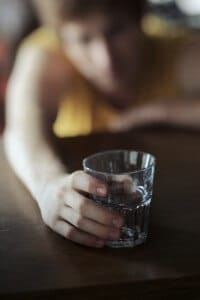Medications commonly used to manage alcohol withdrawal symptoms during the alcohol detoxification process are Benzodiazepines, closely followed by barbiturates. Benzodiazepines such as Diazepam (Trade name – Valium), Chlordiazepoxide (Trade Name – Librium), Lorazepam (Trade Name – Ativan), and Oxazepam (Trade Name – Serax) are the most commonly used drugs.
Benzodiazepines

A common family of drugs used for treating alcohol withdrawal symptoms are the Benzodiazepines, which effectively suppress the symptoms and help in preventing withdrawal-induced seizures. Benzodiazepines enhance the neurotransmitter – GABA or gamma-aminobutyric acid – via the GABAA receptor, which elicits a sedative, sleep-inducing effect. In addition to the hypnotic effects, this class of drugs also have anti-epileptic, anti-convulsant, anxiolytic (anti-anxiety), and muscle relaxant properties.
The prolonged use of these Benzodiazepines have to be considered carefully although they do have a successful history in treating withdrawal symptoms and alcohol detoxification. The medical community has a clear consensus on long-acting benzodiazepines agents like diazepam and chlordiazepoxide, especially for treating cases of delirium. Benzodiazepines with intermediate half-life, such as lorazepam, have been considered safer for use in alcoholics diagnosed with liver diseases. Essentially, the difference in the prescription dosage between long-acting and short-acting drugs only varies in frequency of drug administration, wherein long-acting diazepams may be dosed less frequently as compared to lorazepam. ‘Symptom-triggered drug regimen’ using lorazepam has also been found to be safe and effective, with shorter treatment durations and lower dosages of medications, which is very beneficial in patients with liver problems.
Cross tolerance between alcohol and benzodiazepines is another tricky situation, which can arise in patients extensively dependent on these drugs. As a result, only brief administration of these drugs is suggested in order to avoid creating an addiction or dependence on benzodiazepines in addition to the existing alcohol addiction. Furthermore, excessive alcohol or benzodiazepine-dependence may end up disrupting the normal function of GABA receptors, preventing complete recovery from the addiction-induced mental effects. The cross tolerance effect between the drug – and – alcohol combination would amplify the adverse psychological and depressive effects causing mood-lows or suicidal tendencies.
Anticonvulsants
Carbamazepine (Trade Name: Tegretol) and topiramate are anticonvulsant medications primarily used in the treatment of epilepsy and neuropathic pain. Research studies estimating the effectiveness of these drugs in the management of alcohol withdrawal symptoms are still limited. However, some medical reviews have provided evidence that favours the use of anti-convulsants over benzodiazepines like Chlordiazepoxide, albeit there are certain notable weaknesses in these studies. However, it is significant to note that carbamazepines do play superior roles in treating specific withdrawal symptoms with no life-threatening side-effects.
Vitamins
Chronic alcoholics are severely deficient in essential nutrients, which in turn leads to a number of health complications during alcohol withdrawal and detoxification. Therefore, the prophylactic, intravenous administration of thiamine, folic acid, and pyridoxine before the intake glucose or carbohydrate-rich food or fluids is strongly recommended. To prevent the development of Wernicke syndrome, alcoholics are regularly administered multi-vitamins – particularly generous quantities of thiamine and folate.
Combination of generic drugs for withdrawal symptoms
Combination therapy, when drugs like Clonidine are given in combination with benzodiazepines help in controlling withdrawal symptoms. To suppress aggressive behaviour, agitation or psychosis in withdrawal patients, antipsychotic medications like haloperidol are prescribed in addition to standard benzodiazepines. In a more novel approach, intravenous ethanol administration could also be used to control symptoms, theoretically speaking; however currently there is insufficient medical evidence to support this mode of treatment for alcohol withdrawal syndrome.
Pacific Bay Recovery offers top notch alcohol detox programs with Board Certified providers. Exceptional success rates are achieved and the programs are safe. Call today for more info on the program!


